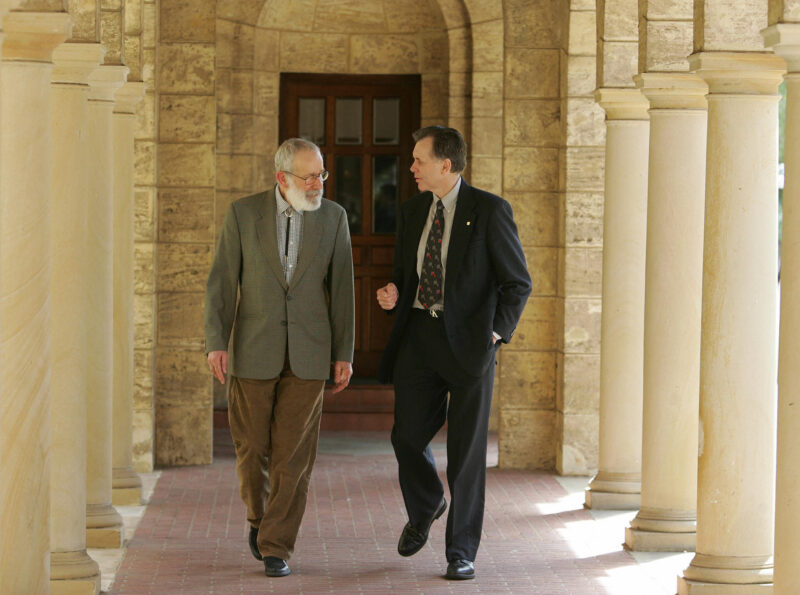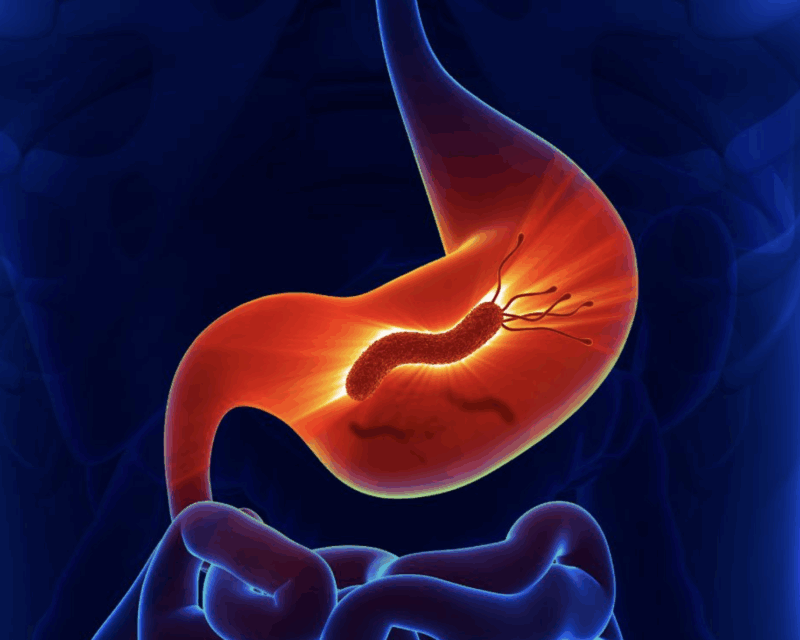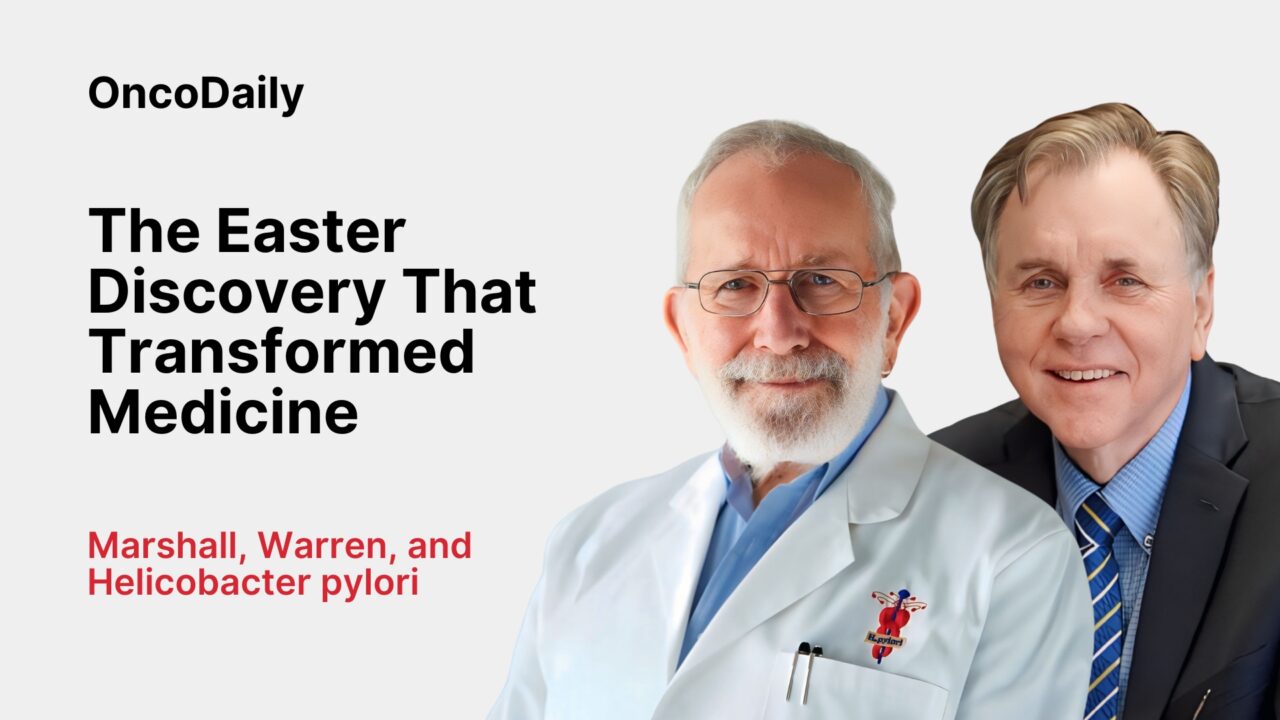In the spring of 1982, while many were celebrating Easter with their families, two scientists in Perth, Australia, were on the brink of a medical revolution. Dr. J. Robin Warren, a pathologist, and Dr. Barry J. Marshall, a young clinician, were working to unravel the mystery behind chronic gastritis and peptic ulcer disease—conditions long believed to be the result of stress, spicy food, and lifestyle choices.
Their journey culminated in one of the most groundbreaking discoveries in modern medicine: the identification of Helicobacter pylori, a bacterium that causes the majority of stomach ulcers and can lead to gastric cancer. This work earned them the 2005 Nobel Prize in Physiology or Medicine.
“Sometimes, breakthroughs happen when you least expect them—and sometimes, they’re born over a long holiday weekend.”

Source: The Nobel Prize/X
A Medical Mystery Revisited
Before the 1980s, the prevailing medical opinion was that the human stomach was too acidic for bacteria to survive. Yet, Robin Warren, while examining gastric biopsy specimens, consistently observed spiral-shaped bacteria colonizing the lower part of the stomach lining in patients with gastritis.
Enter Barry Marshall, a curious and determined clinical fellow. The two teamed up, and their hypothesis challenged long-held dogmas in gastroenterology: what if bacteria—not stress—were the cause of ulcers?
The Serendipity of Easter 1982
Growing Helicobacter pylori in culture proved to be an enormous challenge. The bacteria simply wouldn’t grow in the lab under standard conditions. But then came Easter.
As the story goes, the agar plates containing gastric biopsy samples were mistakenly left in the incubator over the Easter holiday. Instead of the standard 48-hour incubation period, the plates remained untouched for five days. When the team returned, they were astonished to find that numerous colonies of bacteria had grown.
This happy accident revealed the organism’s need for longer incubation—and confirmed that they had indeed isolated a previously unidentified bacterial genus. The bacterium was later named Helicobacter pylori.

From Controversy to Clarity
Initially, the medical community was skeptical. Marshall and Warren faced criticism, disbelief, and even ridicule. After all, their findings suggested that many clinicians had been treating peptic ulcer disease incorrectly for decades.
To prove the causative role of H. pylori, Marshall famously took a bold step: he drank a petri dish culture containing the bacterium. Days later, he developed gastritis, complete with nausea and vomiting. A biopsy confirmed the presence of H. pylori in his stomach. This self-experiment, while risky, provided strong evidence linking the bacterium to disease.
Eventually, the data became undeniable. Eradicating H. pylori with antibiotics and acid-suppressing medication not only healed ulcers but also prevented their recurrence—changing treatment protocols worldwide.
The Nobel Recognition
In 2005, the Nobel Assembly at the Karolinska Institute awarded the Nobel Prize in Physiology or Medicine jointly to Barry J. Marshall and J. Robin Warren:
“For their discovery of the bacterium Helicobacter pylori and its role in gastritis and peptic ulcer disease.”
Their work has since saved millions from unnecessary surgeries and chronic suffering. More importantly, it opened new avenues in the understanding of how chronic bacterial infections can lead to cancer—particularly gastric cancer, one of the leading causes of cancer-related deaths globally.
Legacy of a Discovery
The discovery of H. pylori stands as a testament to the power of observation, perseverance, and thinking outside the box. It also reminds us that medical revolutions can stem from unexpected places—even forgotten lab samples over an Easter break.
More than 40 years later, the legacy of Marshall and Warren lives on in the routine testing and treatment of H. pylori infections, the reduced global burden of peptic ulcer disease, and the ongoing research into cancer prevention.
Quick Facts
- Bacterium: Helicobacter pylori
- Discovered: Easter 1982
- Discoverers: Dr. J. Robin Warren & Dr. Barry J. Marshall
- Nobel Prize: Physiology or Medicine, 2005
- Impact: Transformed the understanding and treatment of peptic ulcers; established a bacterial link to gastric cancer
“Science progresses through curiosity, persistence, and sometimes a touch of serendipity.”
Let the story of Marshall and Warren be a reminder to every researcher: even your ‘mistakes’ might lead to a Nobel-worthy breakthrough.
References:
- The Nobel Prize in Physiology or Medicine 2005 – NobelPrize.org
- Press release: The Nobel Prize in Physiology or Medicine 2005
- Award ceremony speech – Nobel Prize
Learn more about Gastric Cancer on OncoDaily.
By: Md Foorquan Hashmi, MD, Sr. Editor, OncoDaily: India Bureau


